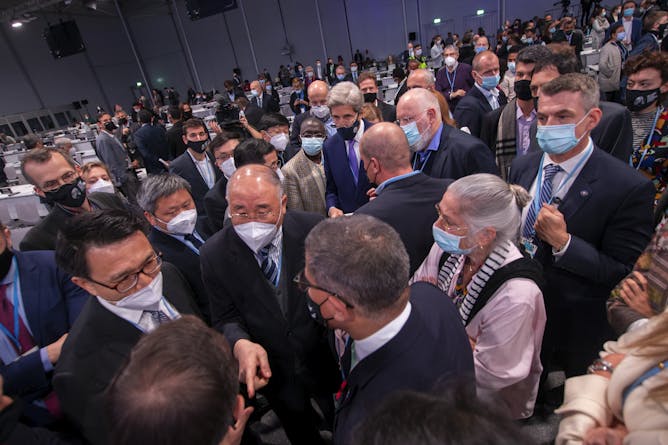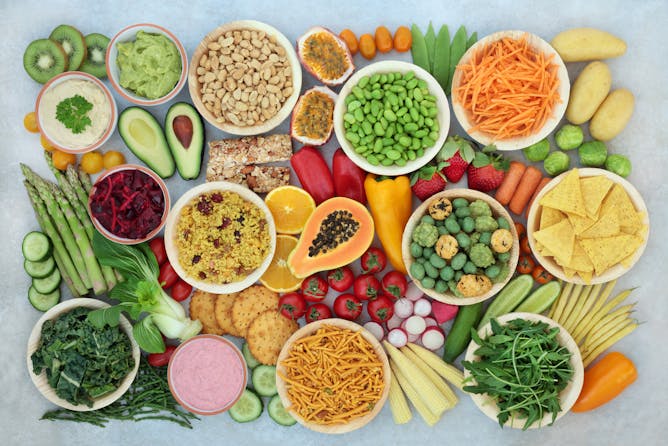|
|
|
|
The gavelling that sealed the Glasgow Climate Pact was muted. Not just on the screens outside the negotiating room, where I watched with journalists jockeying for space. But inside too, where most delegates accepted the text of the biggest climate agreement since Paris in 2015 with weary resignation. After two weeks of intense debate, countries agreed to meet yearly to submit more ambitious emissions-cutting plans, to double aid for developing countries to adapt to extreme weather, and to reduce rather than eliminate (thanks to a last-minute intervention by India and China) unmitigated coal power.
Simon Lewis – a professor of global change science at the University of Leeds – was inside the room with the delegation from Gabon. Together with Mark Maslin, professor of earth system science at UCL – he explains why the goal of limiting global warming to 1.5°C is still on life support, and four other things you need to know about the deal. They were joined over the weekend by experts from across our international network giving their reactions to the most
significant outcomes from the summit. You can read their thoughts on deforestation deals, methane pledges, fossil fuel subsidies and nature-based solutions here.
I’m writing this on the train home after spending the final week of COP26 in the sprawling Clydeside convention centre that hosted it. The three words that were repeated most by delegates I spoke to and that threatened to pierce the conference’s stage-managed facade were “loss and damage” – the harmful impact of climate change that many argue rich countries should pay for. Though plans for a compensation system for poorer countries were blocked, the summit showed this issue is becoming unavoidable.
Elsewhere on The Conversation, you can read about two new antiviral drugs that will soon be available to treat COVID. Here’s what they mean for the pandemic. And if you’ve been inspired by COP26 to cut your own emissions, you might be interested in recent research showing that, contrary to what many believe, going vegan, vegetarian or flexitarian could actually save you money.
For now, our recent donations campaign ends here. We have been heartened by the response of readers over the last two weeks, with almost 1,000 donors helping us toward our annual giving target. If you are able to donate anything toward our aim to spread academic expertise widely and help inform the world, there’s still time.
Donate now
Thanks for your support, and thanks for reading and being part of The Conversation.
|

|
Jack Marley
Environment + Energy Editor and Host of the Climate Fight podcast series
|
|

John Kerry and other delegate in discussions on the final day of COP26.
Rober Perry/EPA
Simon Lewis, UCL; Mark Maslin, UCL
COP26 saw incremental progress but not the breakthrough moment needed.
|

Nina Drozdowa/Shutterstock
Alexander Edwards, University of Reading
Both drugs significantly reduce the chance of people vulnerable to COVID being hospitalised – but they stop the virus in different ways.
|

Going plant-based doesn’t have to mean spending more.
marilyn barbone/ Shutterstock
Marco Springmann, University of Oxford
We found that vegan and vegetarian diets cost a third less than current high-meat, high-dairy diets many people follow.
|
Environment + Energy
|
-
Christina E. Hoicka, University of Victoria; Daniel Sperling, University of California, Davis; Ian Lowe, Griffith University; Kate Dooley, The University of Melbourne; Kyla Tienhaara, Queen's University, Ontario; Mark Maslin, UCL; Piers Forster, University of Leeds; Ran Boydell, Heriot-Watt University; Simon Lewis, UCL
Has the summit delivered on its goals?
-
Robert Hales, Griffith University; Brendan Mackey, Griffith University
From weak 2030 targets to controversial rules around carbon trading, let’s take a look at the summit’s defining issues.
-
Lisa Vanhala, UCL
Loss and damage – the three words which define the COP26 Glasgow summit’s disappointing outcome.
-
Liam F. Beiser-McGrath, Royal Holloway University of London
Politicians have more incentive to react to current climate disasters, but more investment is needed in preparing for future problems.
-
Naomi Jacobs, Lancaster University
Researchers are looking into the potential technological threats to data safety and privacy from the smart supermarkets of the future.
|
|
Politics + Society
|
-
Thomas Brown, Birmingham City University
Racism in cricket means that Black British and British South Asian players are not making it into the elite echelons of the sport.
-
Jennifer Mathers, Aberystwyth University
The crisis at the Belarus/Poland border follows 18 months of political turmoil for the country’s authoritarian president.
|
|
Business + Economy
|
-
Chih-Ling Liu, Lancaster University; Robert Kozinets, USC Annenberg School for Communication and Journalism
An economic approach to emancipation.
-
Jean-Philippe Serbera, Sheffield Hallam University
While cryptocurrencies have exploded in value, so has this sub-genre that mimicks real-world assets like the US dollar.
|
|
Science + Technology
|
-
Pin Lean Lau, Brunel University London
Rabies, for example, is a naturally occurring ‘zombie’ disease.
|
|
Health + Medicine
|
-
Alberto Giubilini, University of Oxford
Differential treatment is not, necessarily, discrimination.
|
|
| |
Featured events
|

|
— Museum of London, 150 London Wall, Barbican, London, EC2Y 5HN, London, London, City of, EC2Y 5HN, United Kingdom of Great Britain and Northern Ireland — Gresham College
|

|
— The Exchange, 3 Centenary Square, , Birmingham, Birmingham, B1 2DR, United Kingdom of Great Britain and Northern Ireland — University of Birmingham
|

|
— Egham Hill, Egham, Surrey, TW20 0EX, United Kingdom of Great Britain and Northern Ireland — Royal Holloway University of London
|

|
— Lecture Theatre One, University of East Anglia, Norwich Research Park, NR4 7TJ, Norwich, Norfolk, NR4 7TJ, United Kingdom of Great Britain and Northern Ireland — University of East Anglia
|
|
|
|
| |
| |
| |
| |
| |
|
|
|
|
|
|
|